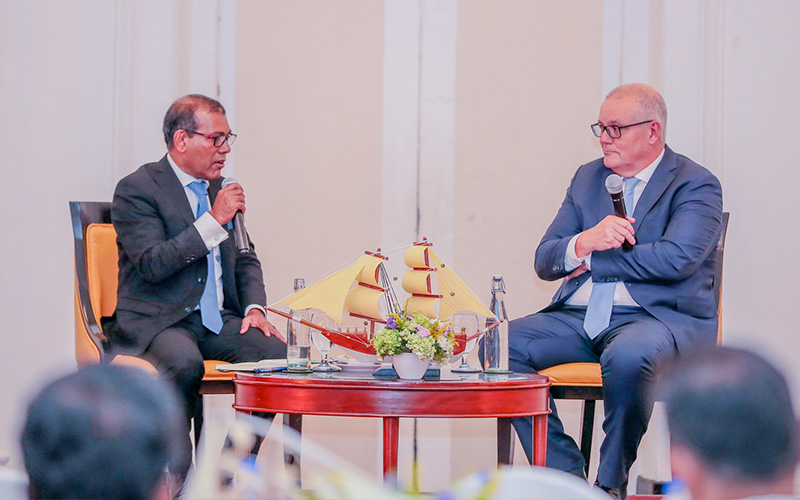
The Geopolitical Cartographer hosted the 30th Prime Minister of Australia Hon. Scott Morrison for a pivotal talk titled “Australia and the Indian Ocean” at the Grand Crystal Ballroom of the Taj Samudra Hotel in Colombo. The event, followed by a discussion and moderated question-and-answer session led by Geopolitical Cartographer Co-Patron Mohamed Nasheed, former President of the Maldives, drew a distinguished audience.
Executive Director of the Geopolitical Cartographer, Rishan de Silva, opened the event by highlighting the historical significance of the Crystal Building, once the grandstand for the Colpetty Race Course after 1821 and later the clubhouse of the Colombo Club, noting its transformation into one of the finest ballrooms in the country.
In his keynote address, Hon. Scott Morrison underscored the strategic importance of the Indian Ocean and Australia’s role in supporting smaller and developing countries in navigating geopolitical pressures. He emphasized the need for nations to resist coercion and maintain sovereignty, especially in the face of increasing influence from major powers.
Morrison highlighted that the current global political landscape is influenced more by economic conditions rather than shifts in ideology. Reflecting on the aftermath of the COVID-19 pandemic, Morrison noted its significant economic disruption and the resultant inflation due to necessary fiscal measures taken during the crisis. He pointed out that these measures, while essential, have led to increased interest rates and exacerbated cost-of-living issues globally.
He further discussed the increasing defence budgets worldwide, driven by the need for heightened global security, which also contributes to inflation. This new economic environment, marked by expansionary fiscal policies and higher interest rates, presents challenges that governments must navigate. Morrison stressed the importance for governments and businesses to understand and factor in geopolitical risks when making economic decisions.
During the discussion moderated by Mohamed Nasheed, Hon. Scott Morrison addressed various geopolitical issues. He acknowledged the challenges faced by smaller nations and highlighted Australia’s commitment to supporting these nations in maintaining their sovereignty and resisting external pressures. Morrison discussed the importance of regional cooperation, particularly within the framework of the Quad, and the need for greater humanitarian, economic, and strategic collaboration in the Indian Ocean.
The discussion also delved into China’s influence in the region, with Morrison emphasizing the need for transparent agreements that do not compromise national interests or security.
Both leaders agreed on the impact of multilateral forums such as AUKUS, BRICS, and the Quad, noting that while these forums may not always represent a united front, they provide valuable opportunities for cooperation on common interests. Morrison stressed that countries should prioritize their national interests and avoid arrangements that could lead to coercion or compromise their sovereignty. He reaffirmed Australia’s stance on ensuring freedom of navigation and supporting the sovereignty of nations across the Indian Ocean.
